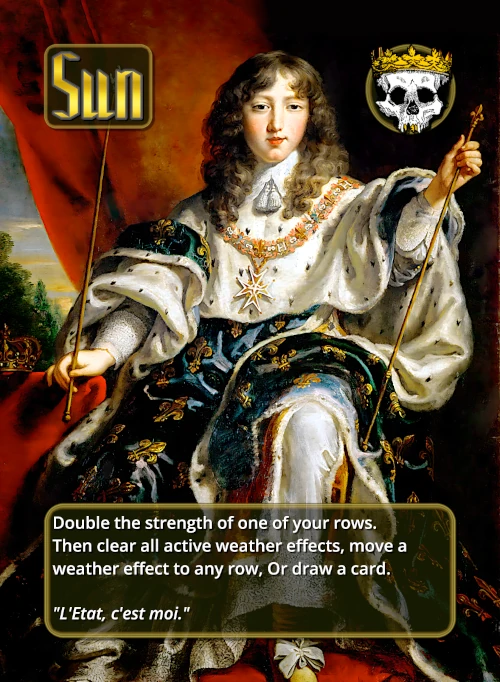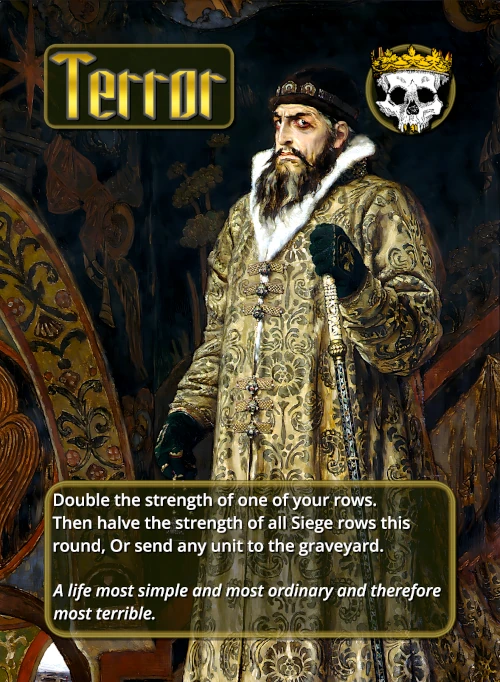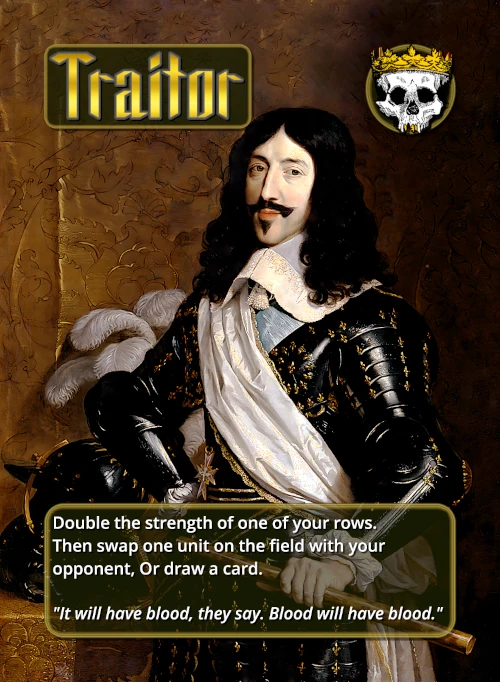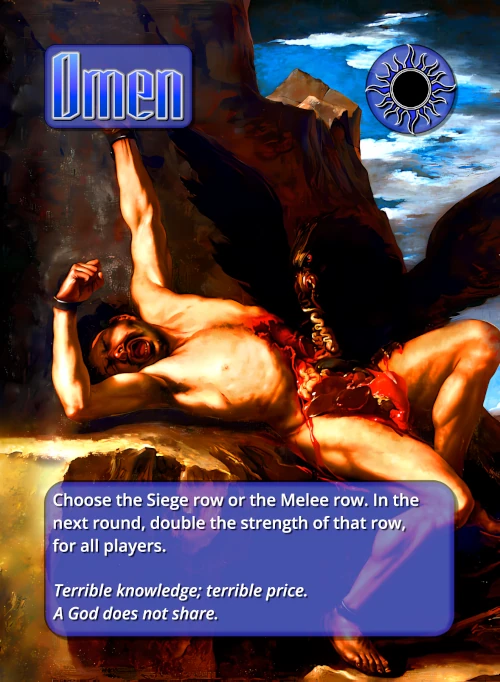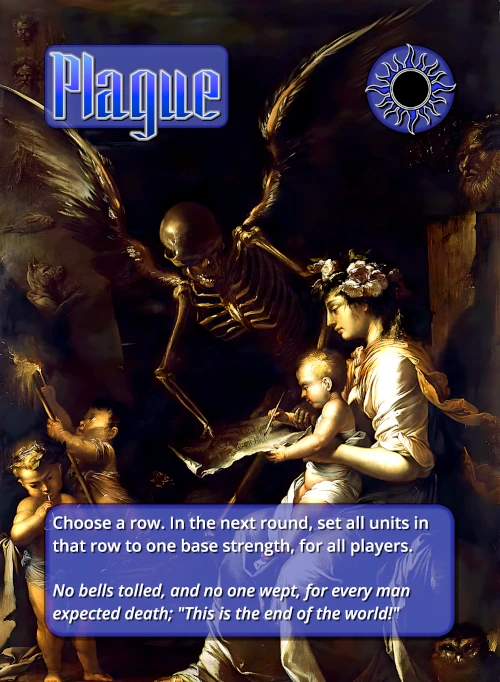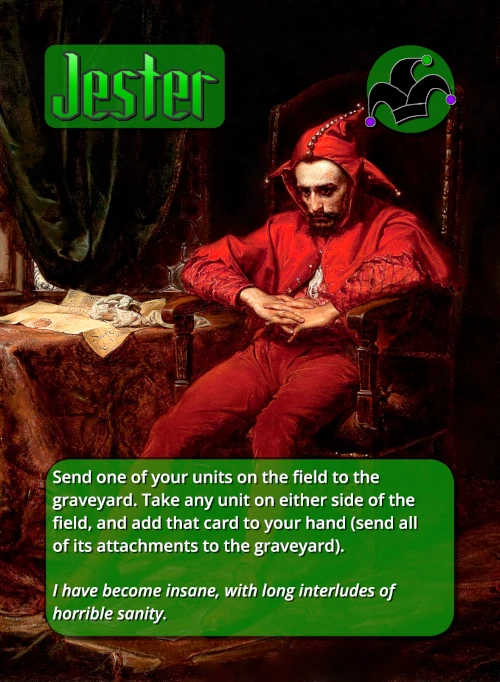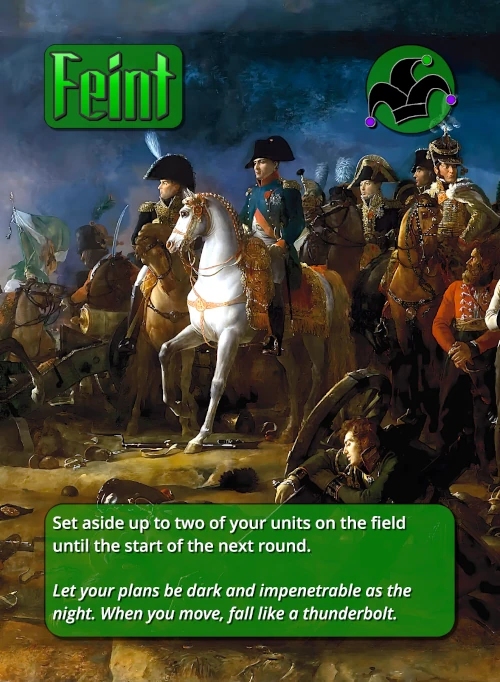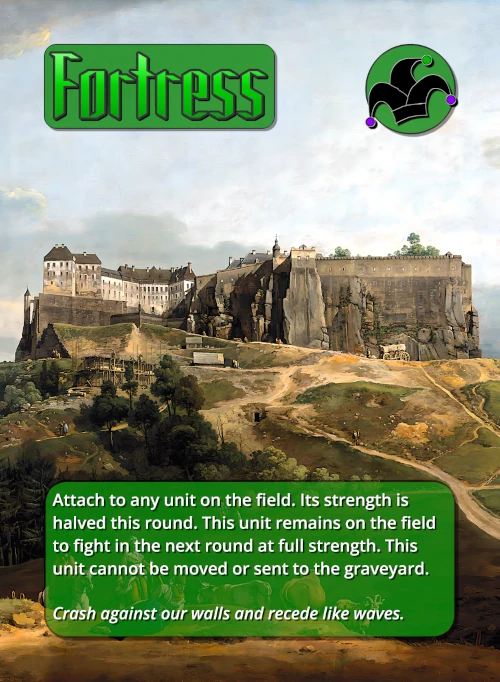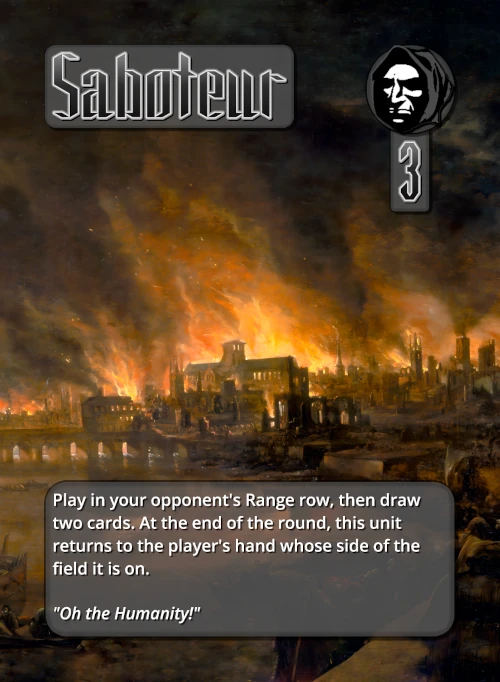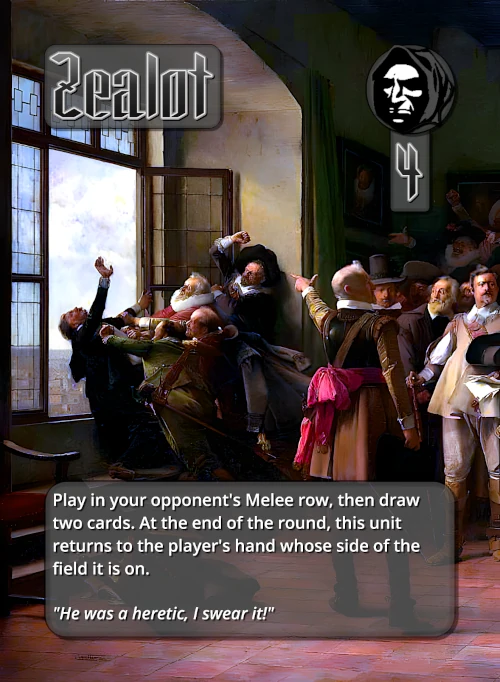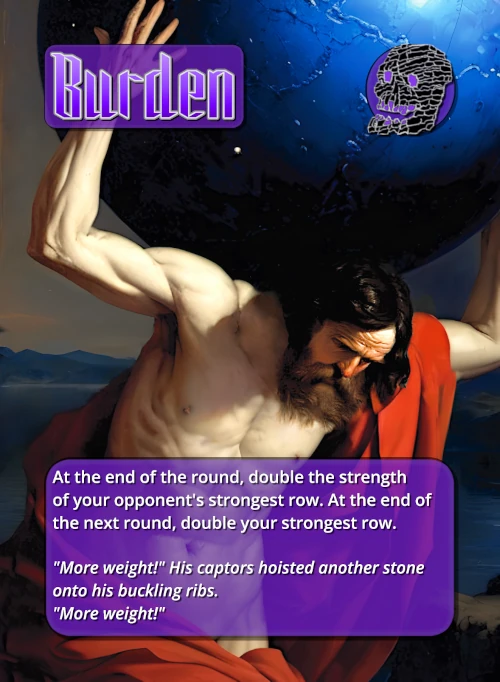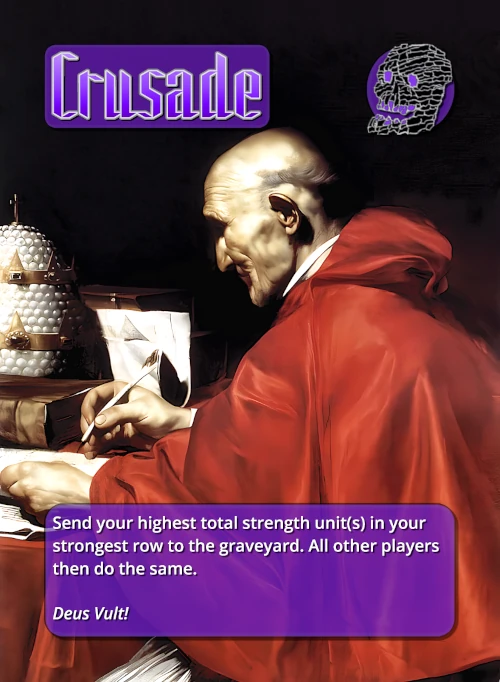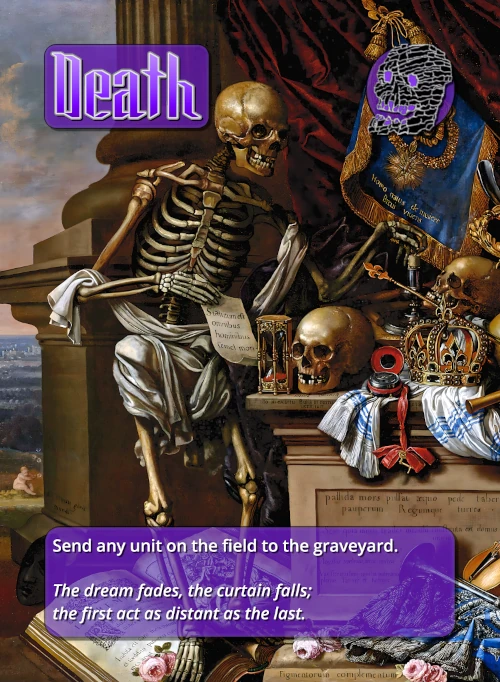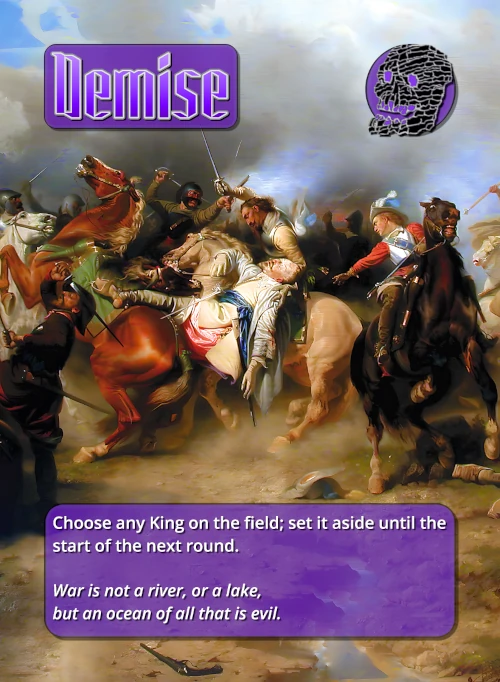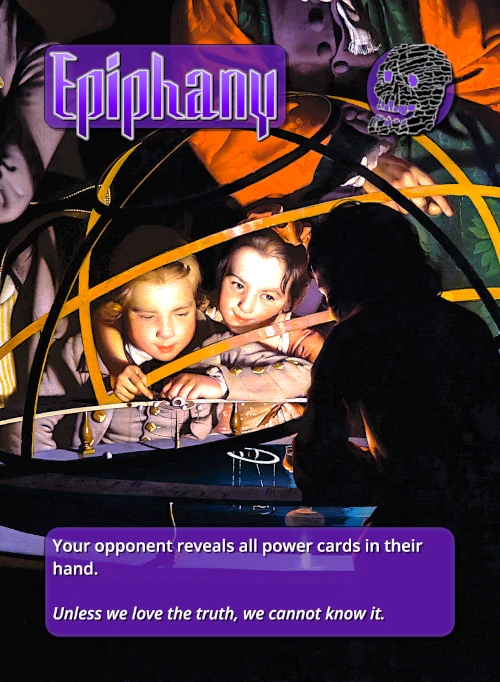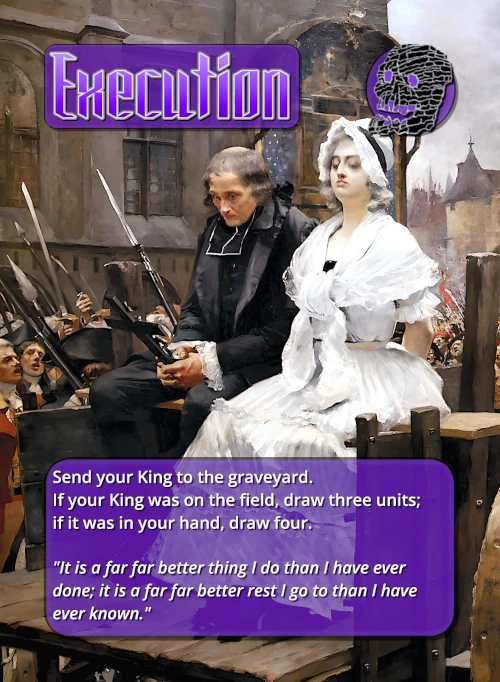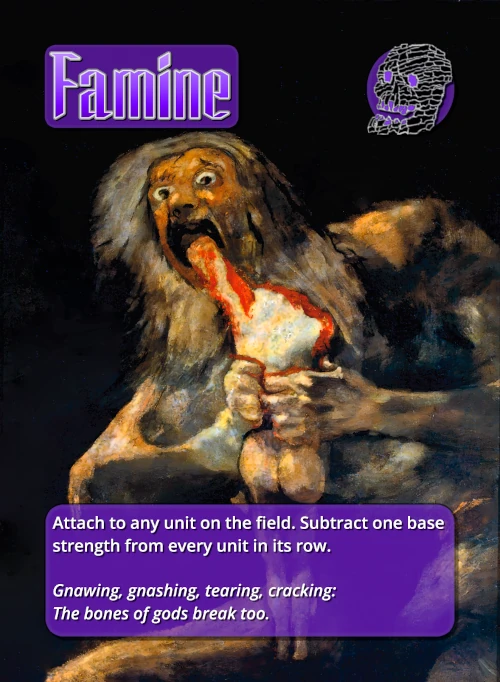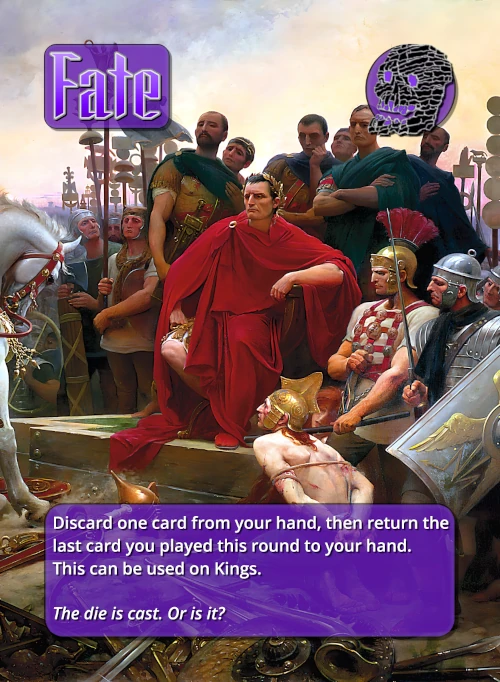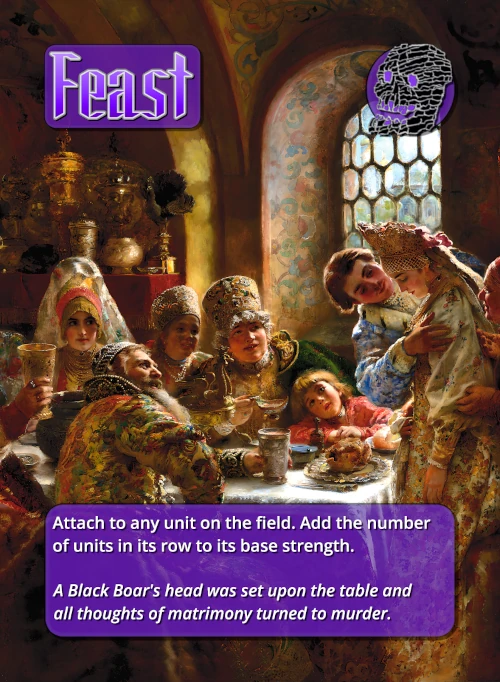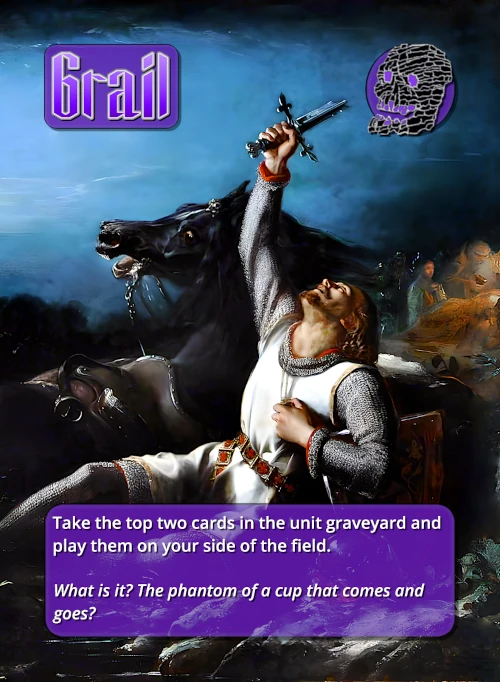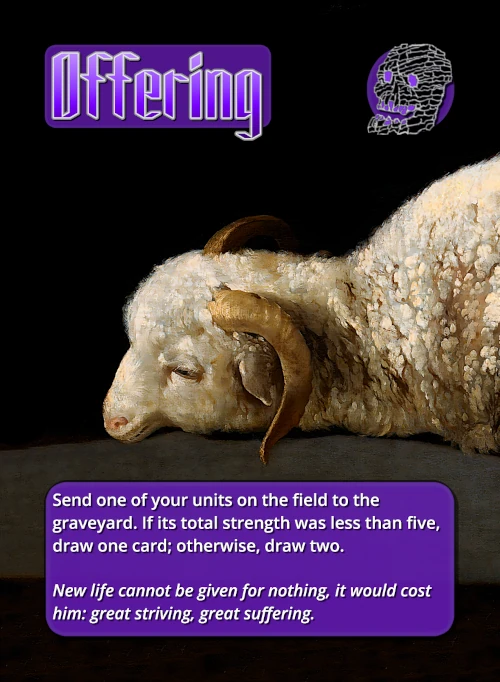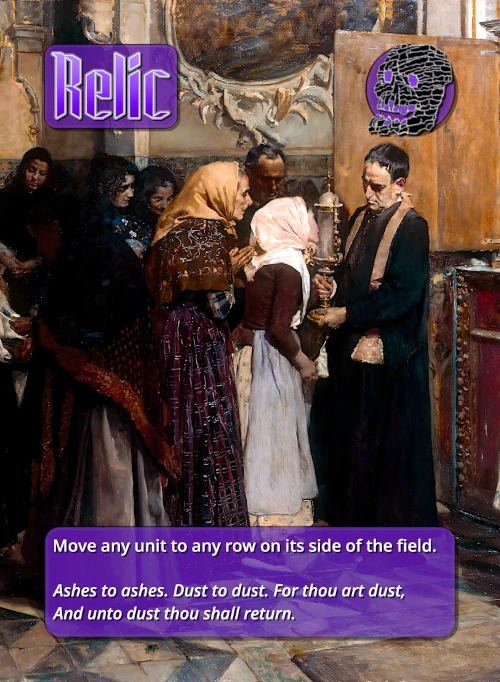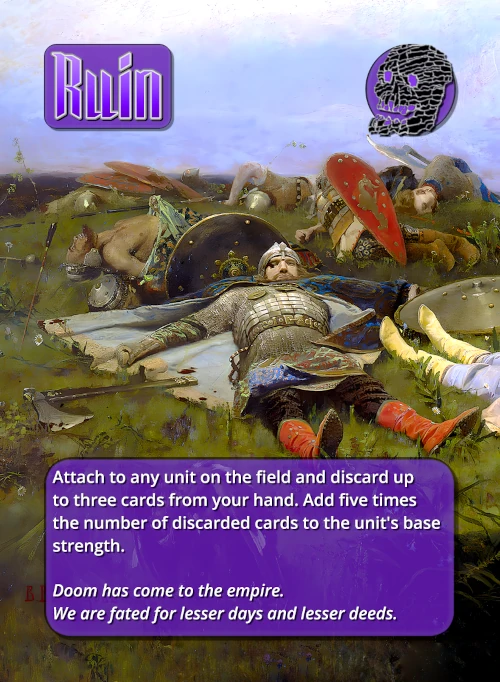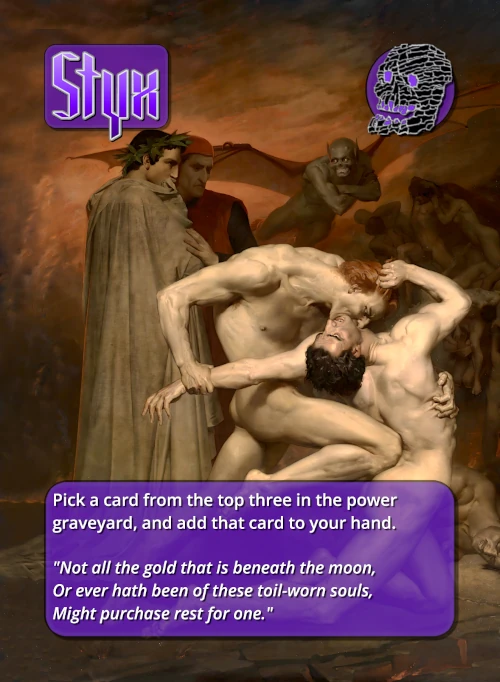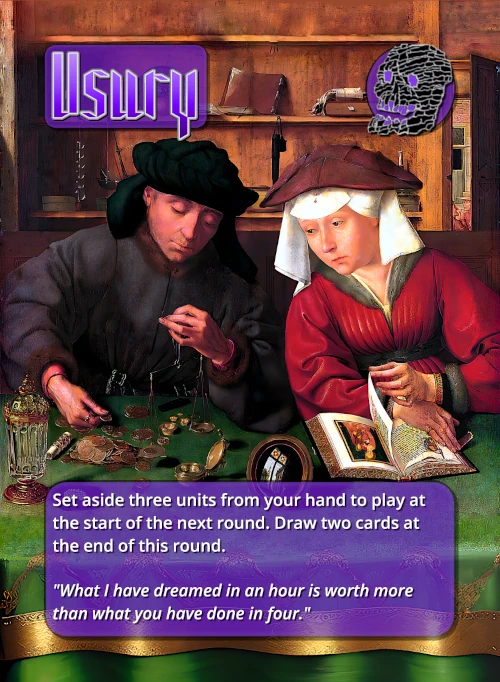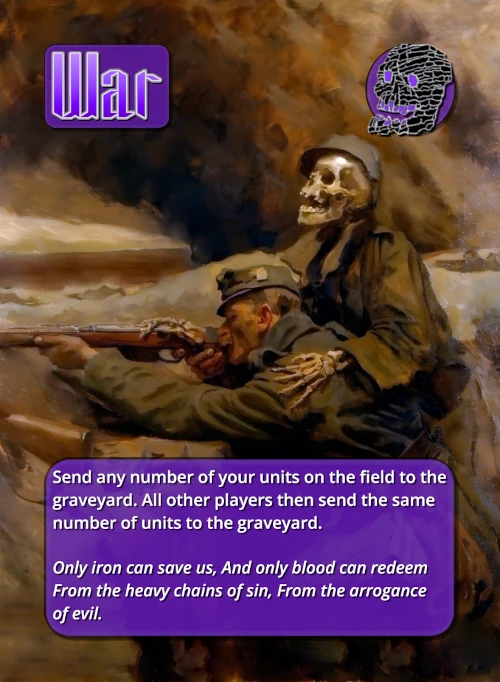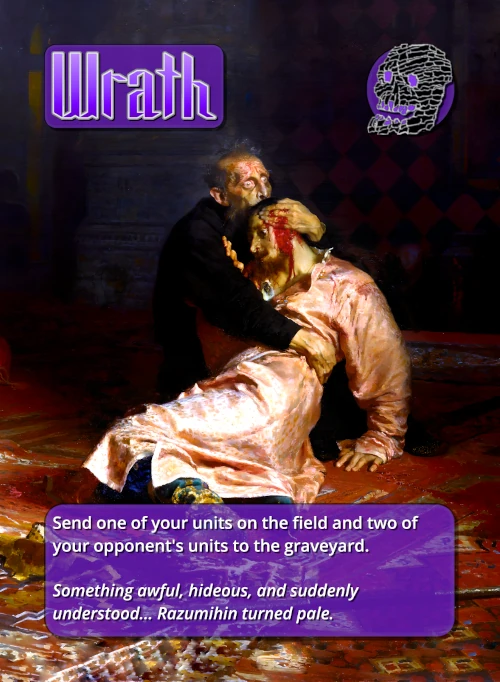Power Card Strategies
Power Card Strategies
Kings
Kings
All King cards allow you to double a row of your choosing, essentially functioning as a trump card for the round. Your opponent will likely need to play their King card or some other counter to remain competitive in that round. Remember, Kings also come with the choice of a unique effect (in addition to doubling a row), allowing you to tailor your strategy as the game unfolds.
The Lion King’s unique powers give you access to a weather effect, or forcing your opponent to set aside units (usually choose the strongest cards, cards with attachments, or break adjacency).
The Sun King’s unique powers give you access to the same weather effect as Gale, or drawing a card.
The Terror King’s unique powers give you access to a weather effect (see strategies for Storm), or sending any unit to the graveyard (see strategies for Death).
The Traitor King’s unique powers allow you to draw a card, or swap a unit with an opponent (usually choose the strongest cards, cards with attachments, or make/break adjacency).
The Winter King’s unique powers give you access to a weather effect (see strategies for Frost), or sending any unit to the graveyard (see strategies for Death).
Weather
Weather
Gale not only counters your opponent’s weather cards, but also is great in combination with your own weather cards. For example, you can misdirect your opponent by playing a weather card early in the round, then using Gale to move that weather away from the original row.
Weather cards, like Omen, which double the strength of a row next round have the advantage that you choose the row, but the disadvantage that your opponent can also capitalize on this information. For this reason, it’s best to play these cards in a row that your opponent has already heavily played in so far (in the hope that they don’t have many of these units left for the next round). Alternatively, trick your opponent by combining with a card like Gale which can move the weather: (1) declare a row to double next round, then (2) move the weather to a different row late in the next round. Remember, you must declare the weather’s row when the card is played.
Weather cards, like Frost, which halve the strength of a row should be used to punish your opponent for playing heavily in a single row, counter a King’s doubling effect, or make a row unattractive to your opponent. It’s best either to (1) play these cards late in the round to take your opponent by surprise, or (2) play these cards early in the round to set up a bluff (e.g. in a combo with Gale). Remember, you must declare the weather’s row when the card is played.
Plague has the advantage that you choose the row, but the disadvantage that your opponent can also capitalize on this information. For this reason, it’s best to play this card in a row that your opponent hasn’t heavily played in so far (in the hope that they mostly have these units left for the next round). Alternatively, trick your opponent by combining with a card like Gale which can move the weather: (1) declare a row to affect next round, then (2) move the weather to a different row late in the next round. Another useful strategy is to play Plague in a row that your opponent is trying to double next round (e.g. with Eclipse), or a row in which they’ve set aside cards for next round. Remember, you must declare the weather’s row when the card is played.
Jesters
Jesters
Jester is a versatile card which can be used to bluff, steal your opponent’s best cards, or disrupt adjacency. Remember that although attachments normally follow a unit wherever it goes, this card specifically says to send any attachments to the graveyard.
Feint is primarily used to bluff and stall by pretending to commit units to the current round, only to set them aside for the next. It can also be used for damage control, in case you realize you will definitely not win the current round, and want to recycle your units into the next.
Fortress works exactly like it sounds like – your unit digs in at an impenetrable stronghold and cannot be destroyed or stolen by your opponent. Try to combine this with other attachments like Feast, Ruin, or your King to make the most use of Fortress’s protection.
Spies
Spies
Spies are a powerful way to stall and obtain card draw, effectively giving you more turns than your opponent; however, your opponent will pick up the spy at the end of the round to use against you. To minimize your opponent’s opportunity for card draw, try to use other power cards to pick up the spy directly from the playing field, send the spy to the graveyard, swap the spy back to your side of the field (so it returns to your hand at the end of the round), or play your spy in the final round of the game.
Similar to other spies, Saboteur comes with the risk of creating adjacency for your opponent, so it is safer to play after your opponent has passed.
Unlike most spies, the Zealot card doesn’t come with the risk of creating adjacency for your opponent.
Hexes
Hexes
Burden is essentially a loan; make your opponent more powerful now, for the promise of becoming more powerful yourself in the next round. The key to using it effectively is to reduce the cost of this loan by either (1) playing it when your opponent is extremely weak, and so you can win the current round despite Burden, or (2) you are going to throw (lose) the current round anyway. Regardless of which strategy you take, you’ll want to play this card late in the round so that your opponent can’t capitalize on this unexpected gift.
Crusade works as a counter for adjacency. If your opponent has many adjacent pairs in the same row, it’s likely that they are also the strongest cards, in which case Crusade would destroy them all. You will need to plan carefully, such that you don’t destroy too many of your own strongest cards.
Death is an extremely versatile card, and can be used to break adjacency, remove a powerful unit, or destroy a spy you’ve played (so that your opponent cannot pick it up at the end of the round). You can also use it on your own units that have negative attachments like Famine.
Demise can either be used to (1) disrupt your opponent’s King to help you win the current round, (2) bluff with your own King, only to utilize it in the next round, or (3) counter an opponent’s bluff if you’ve overcommitted resources this round (by saving your King for next round). Remember that when the set aside King returns to the field, its unique power is not repeated, but it still doubles the row it was originally played in.
If Epiphany is played early in the game, you will see all of your opponents power cards (but they may continue to draw new ones throughout the game). This will allow you to craft your general strategy early on. If Epiphany is played late in the game (say in the last round), you can learn the exact power cards your opponent has left and make a precise plan to counter them to win the game. Remember that you can always ask the number and types of cards in your opponent’s hand, so be sure to use this information to plan when to play Epiphany.
Execution is useful in two main scenarios: (1) if you still have a king, but no units left, you can convert your somewhat useless king into units, or (2) you can bluff running out of units, but then obtain many new ones seemingly from nowhere. Depending on the scenario, you may want to take advantage of your King’s unique power, or simply take the extra unit by playing Execution with your King still in hand.
Famine can be played against your opponent to significantly weaken one of their rows, or could even be played in your own row to create adjacency from units with four base strength.
Fate is primarily used to play another power card twice. For a slightly more complex example, you could play a spy, then use Fate to recover it from your opponent’s side of the field. Although Fate can be used on Kings, its wording is careful to prevent carrying a King over to the next round (because this would effectively give a player two Kings).
The most straightforward way to use Feast is simply to buff your own units. However, more subtle use-cases are to create adjacency for your own units, or even to break adjacency for your opponent. Remember that Feast counts all units in the row, including the unit it is attached to. In addition, if more units are added to or removed from the row after was played, the strength contributed by should keep updating to reflect the current state of the playing field.
Grail can be used to recover the last units sent to the graveyard, so always be sure to keep track of what’s being discarded.
Offering is a great tool for card draw, and is useful to redraw unwanted parts of your hand. Remember that Offering uses total strength to determine how many cards are drawn; therefore, you can send a doubled or adjacent unit to the graveyard to more easily achieve the draw-two condition.
Redemption can be used to bluff by playing your King, then returning it to your hand. An added benefit is that you can use your King’s unique powers twice (once each time your King is played). Remember, the card is worded so that you can’t reobtain your King if it is already in the graveyard.
Relic can move a unit into another row, possibly to create adjacency or benefit from e.g. a King’s doubling.
Ruin is a powerful tool to rapidly increase your total strength. It is likely that the discarded cards have less than five strength each, making a savvy investment. However, concentrating so much strength into a single unit is vulnerable to counters like Death or swapping units. It’s prudent to play after your opponent has already passed, or protect the unit with e.g. Fortress.
Styx can help you reuse your best power cards, or obtain a power card your opponent has recently played. Styx is also useful for stalling, as it allows you to customize your hand and avoid committing resources for a turn.
Usury sets up a loan in which you set aside units now (thereby losing turns and giving up information) in exchange for card draw later. Keep in mind that you will likely lose the round in which Usury is played, unless you’re able to play it after your opponent has passed.
Void is a powerful card, but can be tricky to use correctly. The basic idea is to punish your opponent for either (1) not playing enough units in the early parts of the round, or (2) if they begin stalling, bluffing, or setting up a mulit-card combo. For example, say you have a few more units on the field than your opponent. It may be impossible for your opponent to overcome their total strength deficit in the single turn after Void is played. An extreme case of this strategy is when you have Void and Mortar in hand, and go first for the round. If you lead with , there isn’t a card in the game which can beat Mortar’s base strength, meaning you are guaranteed to win the round.
War is another variant of Death, with the subtlety that all players can choose which cards they send to the graveyard. A good strategy is to flood your side of the field with weaker or undesired unit cards, then play to force your opponent to destroy their stronger units.
Wrath is essentially a more powerful, but more costly, version of Death, and should use the same strategies.










